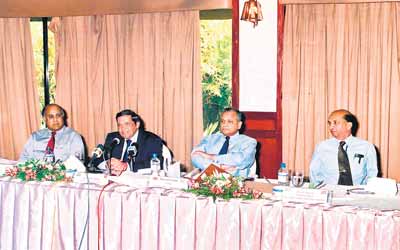
Chicken biriyani and sizzling Indian titbitsIn an interesting comment, Prasad also noted that, in a country where the price of onions can determine changes of government, India is concerned at the prevailing inflation rate of 6.73%. An aura of optimism mingled with the aroma of chicken biriyani when India’s High Commissioner Alok Prasad emphasised that India wanted Sri Lanka to “get the maximum benefit out of the growth process in India.” At a luncheon meeting held at the Taj Samudra last week, prospects of heightened Indo-Lanka trade never looked brighter.
The event was organized by the Indo Lanka Chamber of Commerce and Industry. Having worked in the Office of the Prime Minister, Prasad has been closely involved with India’s reform process and is well equipped to talk about economics and growth. In his maiden engagement with the business community here, he came across as an erudite economist and a champion of free trade. In an incisive and enlightening presentation, Prasad narrated the story of India’s transition. A plodding 3% annual growth rate during the first three decades since independence had earned it the disparaging sobriquet, ‘Hindu rate of growth’. Since 1991, when economic reform and liberalization took effect, however, growth has been twice as fast. What appears to be even more exciting is that growth is accelerating, with the current year expected to record 9.2%. To revitalise the agricultural sector to a 4% growth trajectory, Prasad indicated that there would be “public investment where you have to, private investment where you can”. Prasad pointed out that India’s qualitative and fundamental shifts have been supported by remarkable macro economic stability. In an interesting comment, Prasad also noted that, in a country where the price of onions can determine changes of government, India is concerned at the prevailing inflation rate of 6.73%. A business analyst said one could not help comparing that to Sri Lanka’s inflation figure which is thrice as much, but is generally looked at with a sense of resigned acceptance! In a voice tinged with justifiable pride, Prasad spoke about Indian companies overseas acquisitions: Tata Steel’s takeover of Corus and Dr Reddy’s Labs’ acquisition of Betapharm, among others. He also waxed eloquent on progress in India’s telecom sector, where mobile connections exceeded fixed line connections last year. Prasad repeatedly emphasised that there would be greater integration with global markets, including those in the immediate neighbourhood. Striking a note of caution, he said, “The Indian reform process has been gradualist - and this style will continue.” He believes that the CEPA (Comprehensive Economic Partnership Agreement) will be an effective instrument to give bilateral trade, which was ‘relatively flat’ during 2006, a further impetus. With both nations determined to take the CEPA forward, India is committed to reducing the negative list. He went on to say that there would be an improved chapter on avoidance of double taxation. In response to a question, Prasad informed the gathering that the dismantling of trade barriers inevitably leads to a shakeout. Indian industry has undertaken that journey and emerged “stronger, more efficient and more internationally competitive”. Sri Lanka probably needs to do likewise, the analyst said. |
| || Front
Page | News
| Editorial
| Columns
| Sports
| Plus
| Financial
Times | International
| Mirror
| TV
Times | Funday Times || |
| |
Copyright
2007 Wijeya
Newspapers Ltd.Colombo. Sri Lanka. |
